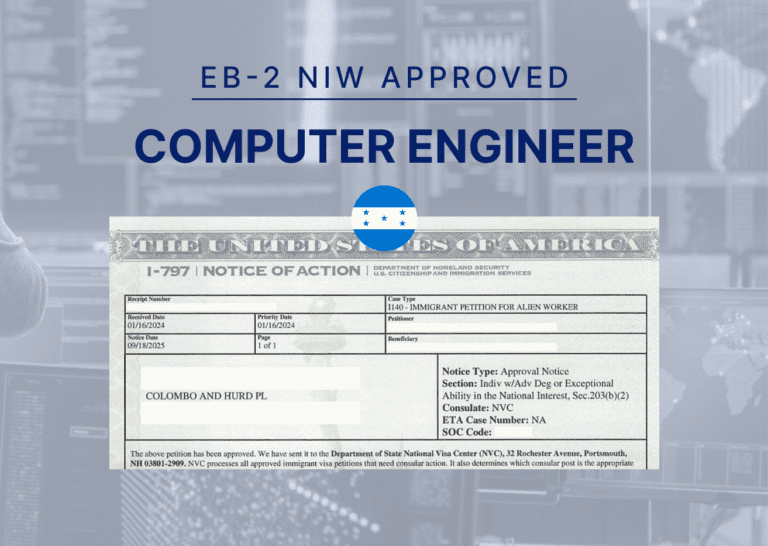Computer Engineer
Businesses in the United States face growing challenges from natural disasters, cyberattacks, and unforeseen crises. Yet only 54% of organizations have a disaster recovery plan. 83% of small and medium-sized businesses remain financially unprepared for data loss, closures, and supply chain disruption.
One Honduran IT leader is helping tackle this growing problem. His career has focused on building disaster recovery strategies and business continuity planning solutions. Over two decades, he has reduced downtime, safeguarded sensitive data, and kept businesses operational during crises.
Because his work advances national resilience and cybersecurity, he became a great candidate for the EB-2 National Interest Waiver (NIW). This program allows highly skilled professionals to bypass the job offer and labor certification process when their contributions serve the U.S. national interest.
This case study, shared by Colombo & Hurd Immigration Attorney Aaron Labreque, details how the team secured EB-2 NIW approval on September 18, 2025, recognizing an IT expert’s mission to keep U.S. businesses running through crises.

From Honduras to the U.S.: Advancing National Disaster Preparedness
Few professionals are as dedicated to helping businesses survive disasters as this Honduran IT leader. Natural disasters can halt small businesses, and weeks without operations often lead to permanent closure. Armed with a computer engineering degree and 21 years of experience, he keeps companies operational through tough crises.
Immigration attorney Aaron Labreque, who focuses on employment-based EB-2 NIW, explains: “Unexpected events like hurricanes or fires can close businesses for weeks, sometimes forever, without solid recovery plans. These plans help maintain supply chains and reduce cascading economic damage, making the case compelling and relatable even though the field is highly technical.”
As a regional IT leader, he built contingency data centers, added real-time data replication, and led continuity testing to keep banking operations running. He also managed teams and directed major infrastructure projects.
Now in the United States, he is launching a consulting company that creates custom Disaster Recovery Plans (DRPs)and Business Continuity Plans (BCPs). These plans help small and mid-sized businesses recover quickly, reduce losses, and keep local economies stable after severe disruptions.
Explaining a Niche Field and Proving National Impact
Presenting this EB-2 NIW case required translating a highly technical and very niche field, business continuity and disaster recovery, into terms a USCIS officer could understand. This field goes beyond helping individual companies. It protects supply chains and strengthens the U.S. economy when disasters strike.
“One of the main challenges was translating highly technical IT recovery concepts into terms an immigration officer could grasp. We focused on real-world consequences, like preventing small businesses from permanent closure, to make the case relatable and compelling,” explained immigration attorney Aaron Labreque.
USCIS officers encounter disaster recovery or business continuity work less frequently than other areas. Our legal team worked with our client to show how downtime after hurricanes, fires, or other emergencies can cause permanent closures and widespread economic loss.
Making a Complex Field Understandable and Relevant
To secure the EB-2 NIW, the team focused on turning highly technical disaster recovery work into a clear national priority. Instead of describing only IT systems, they emphasized real-world outcomes: keeping small businesses running, protecting supply chains, and reducing economic loss after disasters.
Immigration attorney Aaron Labreque explained that they framed the endeavor around FEMA’s National Disaster Recovery Framework and the National Cybersecurity Strategy. Linking the field to these federal priorities made its economic and security value clear to USCIS officers.
“When you show how a technical field prevents small-business closures and protects supply chains, the impact becomes clear,” explained Aaron Labreque. He added that this economic significance made the case compelling and easier for officers to understand, despite its complexity.
The case also presented tangible proof of success: contingency data centers, real-time data replication, and continuity testing that kept operations running during crises. Detailed case studies from the client’s career demonstrated his ability to design and implement disaster recovery solutions.
Finally, the filing outlined plans to launch a U.S. consulting company offering Disaster Recovery Plans (DRPs) and Business Continuity Plans (BCPs). Support letters confirmed market demand and the practicality of the proposed work. These achievements made the petition both credible and highly persuasive to the reviewing officer.
See if you qualify
Get your free EB-2 NIW visa profile evaluation today.
An Approval That Strengthens America’s Business Resilience
USCIS approved the EB-2 NIW, recognizing that business continuity and disaster recovery protect the U.S. economy during hurricanes, fires, and other crises. The decision confirmed that supporting small and mid-sized businesses keeps supply chains operating, preserves jobs, and prevents long-term economic loss.
The approval also proved that highly technical and niche industries can earn EB-2 NIW recognition when presented through economic impact and alignment with national priorities. With his EB-2 NIW granted, this Honduran IT professional can now keep helping businesses recover faster, safeguard assets, and remain stable in the U.S.
Key Insights from the Attorney
Specialized fields can succeed when their economic and national impact is explained in clear, relatable terms. Detailed case studies proved expertise and made the work understandable and persuasive for USCIS officers.
Immigration attorney Aaron Labreque emphasized that this approval shows the firm can guide highly specialized clients and connect their work to U.S. priorities. He noted that teamwork and collaboration were crucial to translate complex technical details into clear, practical economic outcomes.
“Complex, highly technical cases can succeed when a team works together to explain real-world economic impact,” pointed out attorney Labreque.
This experience created a reusable framework for similar cases, helping the team adapt faster and present stronger EB-2 NIW petitions. The ability to simplify technical expertise into clear national benefits is now a recognized strength that drives successful approvals.
Interested in finding out if an EB-2 NIW could support your goals? Start with a free evaluation here.
“One of the main challenges was translating highly technical IT recovery concepts into terms an immigration officer could grasp. We focused on real-world consequences, like preventing small businesses from permanent closure, to make the case relatable and compelling”


